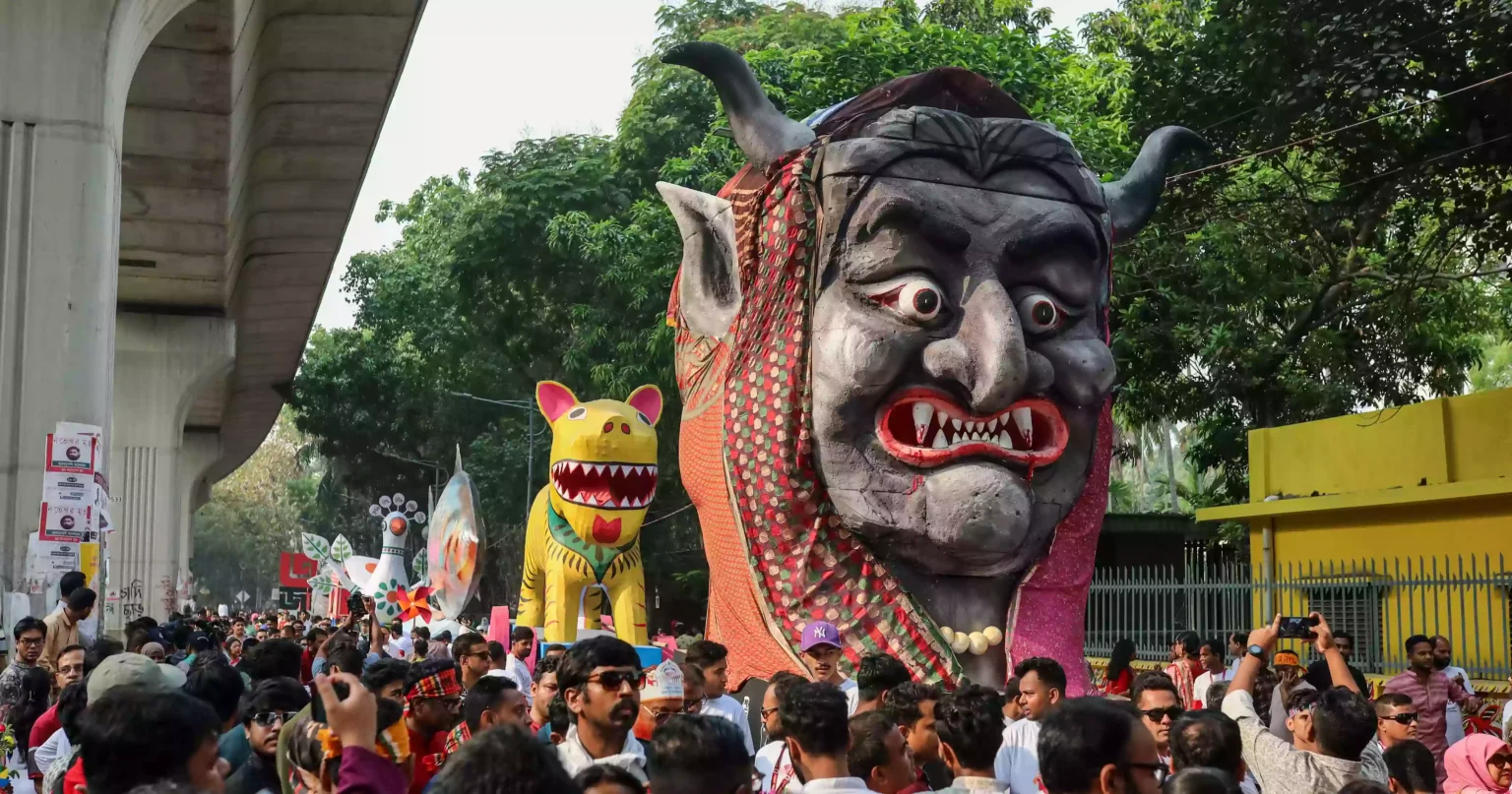Against a backdrop of deep political memory and vibrant cultural resistance, thousands joined the Ananda Shovajatra (Festive Procession) on Pahela Baishakh morning on Monday, marching through the streets of Dhaka in a spirited celebration of Bengali New Year 1432.
But this year’s rally — an emblem of unity and cultural identity — took on a sharper political edge.
Organised by students of Dhaka University, the procession boldly paid tribute to the July-August mass uprising, when thousands rose against authoritarian control and demanded a return to democratic governance.
The symbolism was unmistakable: among the traditional masks and colorful motifs marched a towering effigy — a caricature of former Prime Minister Sheikh Hasina, bearing the grim features of authoritarianism and resembling the face of fascism. It drew widespread attention, applause, and some controversy.
“This rally is not just celebration — it is resistance,” said Jahaan Reza, a final-year sculpture student. “We’re reclaiming Pahela Baishakh from state-sponsored monotony and restoring it as a people’s platform for art, truth, and protest.”
Though typically known as a government-aligned event in previous years, this year’s Shovajatra saw a shift in tone and ownership. The official title was changed from the UNESCO-recognised “Mangal Shovajatra” to the more generic “Ananda Shovajatra”, triggering protest from DU alumni and cultural activists.
“Mangal Shovajatra is a name rooted in our heritage and struggle,” said Zahara Nazifa, a printmaking student. “The authorities cannot just change it without consensus — it belongs to the people, not to any administration.”
Tensions heightened earlier in the week when a motif depicting authoritarianism was allegedly set ablaze in the dead of night — an incident many blamed on supporters of the previous regime. The destruction only galvanised participants further, prompting the artists to rebuild the motif overnight.
“Attempts to censor artistic expression will only amplify our voices,” remarked Professor Niaz Ahmed Khan, Vice-Chancellor of Dhaka University. “This is the essence of a free republic.”
Despite fears of disruption, the rally proceeded without incident under heavy but restrained police presence. Traditional music, colorful masks, and folk drums filled the air, but underneath the celebration ran a current of critique — of power, of silence, of history manipulated.
This year’s theme—’Nababarsher Oikotan, Fascibader Oboshan’ (The Harmony of New Year, End to Fascism)—resonated through the streets as students, teachers, cultural activists and people from various professions joined the colorful celebration.
The procession started at 9am, led by Vice Chancellor of Dhaka University Professor Dr. Niaz Ahmed Khan.
Cultural Affairs Adviser Mostofa Sarwar Farooki, members of 28 ethnic communities, representatives of educational institutions, social and cultural organisations joined the vibrant procession .
The procession started from the Faculty of Fine Arts and ended at the same place after passing through Shahbagh intersection, TSC intersection, Central Shaheed Minar, Physical Education Center, Doyel Square, and Bangla Academy.
The parade featured 8 large diverse motifs—‘Fascist face’ against fascism, Bangladesh’s national symbols tiger and hilsa, white dove as a symbol of peace, Palki, bottle of water by Mughdho, ‘36th July’ and watermelon motif showing solidarity with Palestine.
There was an eye-catching 100-feet-long painting, decorated rickshaws, and horse-drawn carriages.
A decorated horse parade of Dhaka Metropolitan Police was held at the begining.
Alongside members of law enforcement agencies, students of Fine Arts, BNCC, Red Crescent, Rover Scout, and Girls Guide members performed duties as volunteers to ensure security.
Participating in the procession, private university student Raju Ahmed said, “This year’s New Year celebration is a bit exceptional. It sends a message of ending fascism.”


